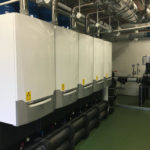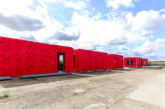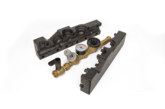 Andy Green, Technical Director at Baxi Heating, offers half term tips to ensure that our schools can rely on a reliable and efficient heating and hot water system as we head into winter.
Andy Green, Technical Director at Baxi Heating, offers half term tips to ensure that our schools can rely on a reliable and efficient heating and hot water system as we head into winter.
As schools prepare to close their gates to all but key workers’ children, the half term holiday is the perfect time to check on the heating and hot water system.
Air quality and ventilation hygiene, along with cleanliness, have been the key areas of focus for school operators in recent months to mitigate the risk of COVID transmission – and many school operators will be planning deep cleans over the holiday period. But ensuring that the heating and hot water service is operating reliably and efficiently is also vital, to keep school buildings functional, efficient, comfortable and safe.
Heating engineers and facilities managers (FMs) have a key role to play in ensuring that the heating system operates efficiently and safely. So what practical steps could, and should, be taken during the short break?
1. Arrange a condition survey
Arranging access to all areas of the building is likely to be easier during the half term holiday, so it’s a good idea to use this time to carry out a survey of the school’s heating and hot water equipment. A visual inspection of the plant, even where there is remote monitoring capability of both the building and heating system, provides the opportunity to check for signs of wear. Regular condition checks help prevent emergency situations that could be costly and – in a worst-case scenario – require the school building to close. They also have the added advantage of allowing any necessary works to be budgeted and scheduled in advance by the school, local authority or trust, reducing disruption and downtime.
2. Book in a service
If the school’s heating system hasn’t had its regular service, then now’s the time to book one in! A routine service of the heating and hot water plant will help ensure that it runs smoothly, keeping efficiencies high and avoiding unnecessarily high running costs.
For boilers, a typical service will include cleaning of both the heat exchanger and condensate trap, flue-gas analysis, checks on gas pressures and interfacing connections like the flue, controls functionality, and water treatment. The service should be carried out as per manufacturer instructions and using only genuine parts. With forward-thinking manufacturers offering comprehensive service kits for their products containing all the genuine parts required for a first-time fix, this will save valuable time and costs, ensure that any existing warranty is maintained, and optimise asset performance and longevity.
3. Controls – up to 15% savings
Inadequate boiler control can add 15% to fuel consumption compared with a well-controlled system. While it’s advisable to check control settings on a regular basis, the half term break provides the opportune moment to adapt them to suit the current building requirements. Where possible, adjusting the controls to reduce heat outputs in the areas of the school that are unoccupied during the break will save energy and therefore costs. It’s worth remembering that turning the thermostat down by just 1°C could reduce the school’s heating bills by 10%, according to the Energy Saving Trust.
If an extended half term holiday is anticipated, it’s advisable to reduce the outputs further to keep bills down while protecting the building fabric and reducing the risk of microbial contamination (which can cause corrosion).
4. Limescale – 7% energy savings
Water quality can affect both the performance and lifespan of boilers and the heating system. If left untreated, sludge and debris can accumulate overtime in pipes and radiators, affecting the circulation of water in the primary circuit and heat output, and reducing the efficiency of the overall system.
In hard water areas, lack of water treatment can lead to the build-up of limescale in domestic hot water heat exchangers. This creates an insulating layer, inhibiting heat transfer to the water. A 1mm layer of limescale will cause a 7% increase in energy input to the domestic hot water system to meet the same heat demand.
Water treatment can resolve both issues. This should be carried out annually by a qualified technician, with water quality checked on a regular basis – such as at half term.
5. Plan ahead
With the resurgence of the virus resulting in changing rules, differing local guidance and the possibility of a second national lockdown, it pays to be prepared. Consider flushing out the hot water system, including the outlets and pipes, thoroughly on a regular basis to ensure good water quality and eliminate any risk of legionella.
For schools that are planning boiler replacements, on site safety will be key. Turnkey prefabricated boiler rig modules may provide the most appropriate solution, enabling safety and speed of installation to be prioritised with fewer workers required and less time spent on site.
The autumn half term might be a holiday for the children, but for school operators, FM providers and heating engineers, it’s a welcome time to act and plan for the winter months, so that the school’s heating and hot water system is one thing less to worry about.









